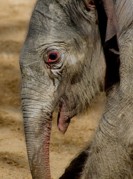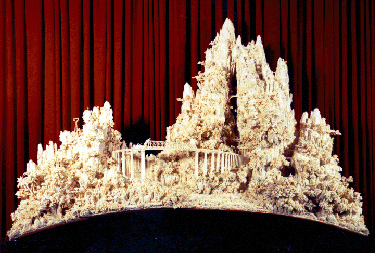elephants
Mali. Melbourne's new baby Elephant celebrated in a Buddhist ceremony
Melbourne Zoo's baby elephant has been blessed by Buddhist monks after Victorians voted to name her "Mali", the Thai word for the jasmine flower.

(Jasmine flowers)
The elephant is a national symbol for Thailand and the animals are usually named after local flowers. The elephant herd originally came from Thailand, and records say that 94% of Thais are Buddhists.
Sadly, there is no animal "Christening" or official Blessing ceremony in the Christian church.
There is little or no agenda in the church to recognize non-human creatures, despite their worshipping of God of All Creation.
Buddhists advocate vegetarianism because it is about "mercy", and because they Karma tells them that we must eventually all suffer the consequences of evil actions. Not all Buddhists are vegetarian and the Buddha does not seem to have issued an overall prohibition on meat-eating.
Utilitarian Creation
 The church has endorsed the idea that animals value in the created order according to their benefits for us humans. Creation has been viewed primarily as a utilitarian object, as something to be valued according to its use by human beings. This devaluation of animal life has led to the extinction of whole species and to unnecessary cruelty to animals.
The church has endorsed the idea that animals value in the created order according to their benefits for us humans. Creation has been viewed primarily as a utilitarian object, as something to be valued according to its use by human beings. This devaluation of animal life has led to the extinction of whole species and to unnecessary cruelty to animals.
Buddhism
Animals have always been regarded in Buddhist thought as sentient beings, different in their intellectual ability than humans but no less capable of feeling suffering. The Buddha expounded that sentient beings currently living in the animal realm have been our mothers, brothers, sisters, fathers, children, friends in past rebirths. We may not share this belief, but is levels all life to Earth's Creatures, and gives us humans a commonality, a communion of shared suffering and shared life.
Herding cultures
The Judaic and Christian religions are based on a history of herding animals and their numbers being a status symbol of power and wealth. Animals are "owned", considered resources and as property, not sentient creatures with intrinsic value and rights. Animals are thus not encompassed in the circle of Christian compassion and mercy. The duty of humans to care for Creation, and take dominion, has virtually meant ignoring the great responsibilities that come with this privilege.
Secularism
In a secular, purely scientific system, all species' worth is measured just by their success in adapting to and surviving in whatever environment they find themselves. This is the ultimate in self-centered, selfish system. A Creator that has his hands on the planet's great design, and ecosystems that support even the smallest sparrow, is surely especially proud of the birth of the more intelligent and magnificent of species - such as whales and elephants?
Maybe it is time some church leaders came out of their cultural enclaves and started to preach about humility, the one-ness of Creation and have a voice for all God's creatures?
The birth of a baby elephant should be celebrated as a new individual of great cultural and social value. However, elephants should not be kept confined in zoos for human entertainment. The people should be in the cages to view wildlife in their natural surrounding, or on viewing platforms.
African Elephants - still slaughtered for tusk ('ivory') trinkets by backward Japanese and Chinese
The magnificent African Bush Elephant bull (male) walking tall in its native savannah homeland

Out of Victorian colonial exploits of the 19th Century, elephant tusks could be found butchered and refined into expensive goods, notably billiard balls, piano keys, Scottish bagpipes, garment buttons, letter openers and for many ornamental items otherwise considered mere 'trinkets'.
After the elephant tusk ('ivory') trade had decimated the African Elephant population from 1.3 million to 625,000, finally in 1989 the Environmental Investigation Agency (EIA) imposed a ban on this international elephant tusk (ivory) trade.
Ten years on, Zimbabwean dictator, Robert Mugabe, lifted the ban along with Botswana, Namibia, and South Africa and legalised the sale of elephant tusks from elephants they claimed (a) had died naturally or (b) been shot because they were violently aggressive or for 'problem-animal' control. In 1999, the Convention on International Trade in Endangered Species of Wild Fauna and Flora (CITES) authorized an auction of 50 tons of elephant tusks (ivory) from these four countries to the value of USD$5 million. Notably, the demand for elephant has been driven outside the African continent, in this episode mainly by Japan. [I could find a comparable solution for problem Mugabe control]
In 2008, China was also given permission to become a licensed buyer of elephant tusks (ivory) and this followed 108 tons of elephant tusks (ivory) being auctioned from these same four African countries, representing the death of over 10,000 African elephants.
"The growing demand for elephant tusks (ivory) has increased black market prices from $200 per kilo to $850 per kilo in the past four years thus creating a big financial incentive for poachers. Michael Wamithi, program director for International Fund for Animal Welfare’s global elephants program, and former director of the Kenya Wildlife Service, declared: "An estimated 20,000 elephants are slaughtered annually for the trade in their tusks. Many African elephant range states clearly do not have the capacity or resources to combat these massive attacks on their countries' wildlife heritage and the burgeoning markets in China are only fuelling these attacks."
The Environmental Investigation Agency (EIA), which exposes environmental crimes, said CITES had ignored appeals from other African nations not to increase pressures on their elephant populations which were already struggling with wars, instability, droughts and poverty. EIA chairman Allan Thornton said: "Responsibility for the poaching of 20,000 elephants in Africa each year will now lie with those who supported China obtaining legal ivory trade even though they continue to be the world's biggest destination for poached ivory."SOURCE
This elephant tusk (ivory) carving (photo) is a gift from China presented to the United Nations in 1974. It depicts the Chengtu-Kunming railway, which was opened to traffic in 1970. The sculpture was carved from eight elephant tusks. In elephant terms, four mature bull elephants were killed for this elaborate trinket.
One wonders whether the United Nations is still pleased with its eight bull elephant tusk trophy (shot and hacked off from a bull elephant like that above)?


Recent comments